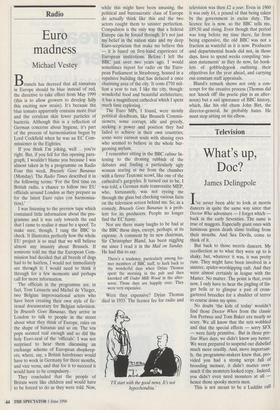Radio
Euro madness
Michael Vestey
Brussels has decreed that all tomatoes in Europe should be blue instead of red, the directive to take effect from May 1999 (this is to allow growers to develop fully this exciting new strain). It's because the blue tomato apparently contains more fruit and the cerulean skin fewer particles of bacteria. Although this is a reflection of German concerns about hygiene, it's part of the process of harmonisation begun by Lord Cockfield when he was an EC Com- missioner in the Eighties.
If you think I'm joking, well ... you're right. But, if you fell for this opening para- graph, I wouldn't blame you because I was almost taken in by a programme on Radio Four this week, Brussels Goes Bananas (Monday). The Radio Times described it in the following terms: 'For the first time on British radio, a chance to follow two EU officials around London as they prepare us for the latest Euro rules (on harmonisa- tion).'
I was listening to the preview tape which contained little information about the pro- gramme and it was only towards the end that I came to realise it must be a spoof. To make sure, though, I rang the BBC to check. It illustrates perfectly how the whole EU project is so mad that we will believe almost any insanity about Brussels. If someone told me that the European Com- mission had decided that all breeds of dogs had to be hairless, I would not immediately see through it; I would need to think it through for a few moments and perhaps call for more information.
The officials in the programme are, in fact, Tom Lenaerts and Michel de Vlieger, two Belgian improvisational actors who have been creating their own style of fic- tional documentary for Belgian television. In Brussels Goes Bananas, they arrive in London to talk to people in the street about what they think of Europe, rules on the shape of bananas and so on. The vox pops seemed real enough and so did the holy Euro-zeal of the 'officials'. I was not surprised to hear them discussing an exchange scheme of European shopkeep- ers, where, say, a British hairdresser would have to work in Germany for three months, and vice versa, and that for it to succeed it would have to be compulsory.
They concluded that the people of Britain were like children and would have to be forced to do as they were told. Now, while this might have been amusing, the political and bureaucratic class of Europe do actually think like this and the two actors caught them to sinister perfection. Compulsion is the only way that a federal Europe can be forced through. It's not just my belief in the nation state and my deep Euro-scepticism that make me believe this — it is based on first-hand experience of European institutions. Before I left the BBC just over two years ago, I would sometimes report for radio on the Euro- pean Parliament in Strasbourg, housed in a repulsive building that has defaced a once charming area of the city. It costs £750 mil- lion a year to run. I like the city, though: wonderful food and beautiful architecture; it has a magnificent cathedral which I spent much time exploring.
The Euro MPs, I found, were mostly political deadbeats, like Brussels Commis- sioners, some corrupt, idle and greedy, seeking a power and position they had failed to achieve in their own countries; some were earnest souls with shining eyes who seemed to believe in the whole bur- geoning asylum.
I remember sitting in the BBC cabine lis- tening to the droning rubbish of the debates and finding a particularly ugly woman staring at me from the chamber with a fierce Teutonic scowl, like one of the cathedral's gargoyles. It turned out to be, I was told, a German male transvestite MEP, who, fortunately, was not eyeing me through the glass but checking various facts on the television screen behind me. So, as a comedy, Brussels Goes Bananas is a prob- lem for its producers. People no longer find the EC funny. Nor are there many laughs to be had at the BBC these days, except, perhaps, at its expense. A comment by its new chairman, Sir Christopher Bland, has been niggling me since I read it in the Mail on Sunday. He had this to say:
There's a tendency, particularly among for- mer members of BBC staff, to hark back to the wonderful days when Dylan Thomas spent the morning in the pub and then knocked off Under Milk Wood in the after- noon. Those days are happily over. They were very expensive.
Were they expensive? Dylan Thomas died in 1953. The licence fee for radio and 'I'll start with the good news. It's not hypochondria.' television was then £2 a year. Even in 1960 it was only £4, a pound of that being taken by the government in excise duty. The licence fee is now, so the BBC tells me, £89.50 and rising. Even though that period was long before my time there, far from being expensive, the old BBC was not a fraction as wasteful as it is now. Producers and departmental heads did not, in those days, have to spend weeks compiling 'mis- sion statements' as they do now, fat book- lets of gobbledygook outlining their objectives for the year ahead, and carrying out constant staff appraisals.
Bland's remark shows not only a con- tempt for the creative process (Thomas did not 'knock off the poetic play in an after- noon) but a sad ignorance of BBC history, which, like his old chum John Birt, the director-general, he probably hates. He must stop sitting on his elbow.


























































 Previous page
Previous page